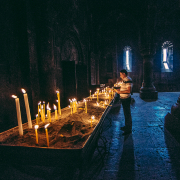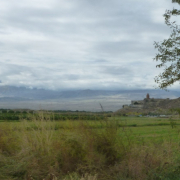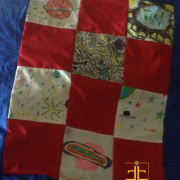Think up to Mystery
Armodoxy for Today: Cognition
One of the greatest gifts given to us by God is the ability to think, to reason, to wonder and ponder, to question and then arrive at a conclusion. In fact, the idea of thinking is tied in intimately with the Christian understanding of life, that is, because we think we have the ability to make decisions, good or bad. God calls us to exercise our free will and make decisions from the most mundane, such as getting out of bed on the right or left side, to the most extreme limits of life, such as deciding whether to drive recklessly while intoxicated. Accordingly, our actions have consequences – rewards and punishments – because we have the ability to think and make decisions. If we didn’t have a choice in decisions, we would be living according to fate and therefore not accountable for any of our actions.
As children, we learn early that our actions have consequences. Our learning is assisted by memory. The first time we place our hand near a hot stove, we feel the heat, perhaps we burn ourselves, and we learn that stoves are hot. Imagine if we didn’t learn and every time we saw a stove we stuck our hand into an open flame, our safety and long term chances of survival would be severely diminished. Thinking is good. Reasoning is good.
Often, religions call on their followers to blindly accept doctrine without putting it to the test, hence the expression, check your brain in at the door. This develops from a misunderstanding of Jesus’ words to trust. He asks us to trust and to have faith. Actually, to truly trust and have faith one needs to fully engage with the powers of reason and rationality. Jesus used parables to explain some of the most complicated and complex concepts in human understanding. The use of parables presupposes the use of intelligence to decipher, to make connections with metaphors and to understand.
There are, of course, many concepts and ideas that are difficult to decipher, for instance the origins of the universe or the extent of time and eternity. When we designate these to the great “mysteries” we are not advocating for an abstention from brain usage. Quite the opposite, we’re saying through the cognitive process, we have exhausted the possibilities of our humanity, but do not discount the possibility of more beyond our sensory perception. Here, we confront God. These are the primal instincts that draw humanity to religious understanding.
Armodoxy begins with a challenge to allow God to be God and us to be human. When we relinquish what we cannot understand or comprehend to the divine realm, we are taking a very real and practical approach to life. Eternity can wait! We have faith that Christ will lead us there. We then focus our attention to the world at hand and how we can become the instruments of peace, the workers for righteousness, the Children of God who by living for peace (Matthew 6:9). Armodoxy is about the here and now. It’s following Jesus’ words, that God’s will must be done on earth as it is in heaven.
We end today with the words of our Lord Jesus, who proclaims, (Matthew 5:3-10)
“Blessed are the poor in spirit, for theirs is the kingdom of heaven.
Blessed are those who mourn, for they shall be comforted.
Blessed are the meek, or they shall inherit the earth.
Blessed are those who hunger and thirst for righteousness, for they shall be filled.
Blessed are the merciful, for they shall obtain mercy.
Blessed are the pure in heart, for they shall see God.
Blessed are the peacemakers, for they shall be called sons of God.
Blessed are those who are persecuted for righteousness’ sake, for theirs is the kingdom of heaven.
Cover photo: The thinkers of Griffith Observatory, Fr. Vazken 2009

 2012 Fr. Vazken
2012 Fr. Vazken 2014 Greg Beylerian
2014 Greg Beylerian



 2023 Fr. Vazken
2023 Fr. Vazken

 2019 Fr. Vazken
2019 Fr. Vazken
Leave a Reply
Want to join the discussion?Feel free to contribute!